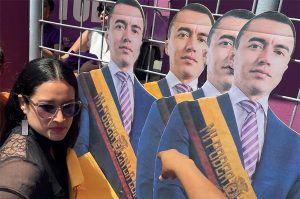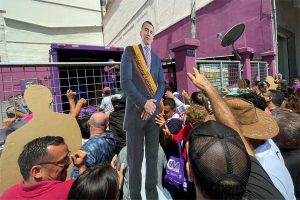
Peru’s government declared a state of emergency in the capital of Lima and three other regions, yesterday. The 30-day order, which follows a now-expired nationwide state of emergency, suspends several constitutional rights, including freedom of transit, freedom of assembly and the right to privacy in the home. It permits the armed forces to intervene to maintain order, in the midst of massive protests calling on President Dina Boluarte to resign.
At least 47 people have been killed in protests over the past month, since former President Pedro Castillo attempted a self-coup, was ousted by Congress, and detained for allegedly “violating the constitutional order.” Castillo’s supporters feel he was unfairly ousted, and widespread protests have called for a new constitution, as well as Boluarte’s resignation, immediate elections and Castillo’s release from pre-trial detention.
While many observers believe Castillo’s impeachment and arrest were “made on firm legal and constitutional grounds,” the former president’s supports, many of them from the country’s poor, rural and Indigenous populations, are angered by , ouster of a president who represented them, pushed out, they say, by an urban elite anxious to preserve the status quo. (Miami Herald)
Security forces’ heavy-handed repression of protesters has incited anger and fresh demonstrations, as well as allegations of genocide. Human rights groups have accused security forces of using live ammunition.
On Friday Boluarte lamented the deaths, but refused to step down. She also resisted calls for a constitutional convention, pointing to the difficulties Chile has faced in its own attempts to rewrite its magna carta. “That cannot happen overnight,” Boluarte said.
Three ministers resigned last week. As of Jan. 12-13, 71% of Peruvians disapproved of Boluarte’s government up from 68% in December, according to an Ipsos poll published yesterday.
(Washington Post, AFP, Al Jazeera, Reuters)
Brazilian authorities search for attack masterminds
Brazil’s Supreme Court said former President Jair Bolsonaro will be investigated as part of the inquiry into attacks on Brasília that authorities say were aimed at toppling the new Lula administration. (Guardian)
Supreme Court Justice Alexandre de Moraes said Bolsonaro’s past questioning of Brazil’s election system and his attacks on Brazil’s institutions, including the Supreme Court, “may have contributed, in a very relevant way, to the occurrence of criminal and terrorist acts,” including Jan. 8’s storming of government buildings. (New York Times)
Officials say rioters who attacked the buildings housing Brazil’s three branches of national government sought to encourage a military intervention and oust President Luiz Inácio Lula da Silva, reports the Guardian.
There are troubling signs of collusion between security forces and the rioters. Evidence includes attempts by the military to protect the insurrectionists after the attacks, a change in the security plan before the attacks, police inaction and fraternization as rioters began entering the buildings, and the presence of a senior officer of the military police who had told superiors he was on vacation, reports the Washington Post. Before the attacks, the military had twice blocked authorities from clearing a camp of Bolsonarista supporters in Brasília that the rioters used as a base.
“Interviews with security officials yielded accusations of gross negligence and even active complicity in the mayhem,” reports the New York Times.
Bolsonaro’s former justice minister, Anderson Torres, was arrested on Friday in connection to the attacks. (Guardian) Last week authorities found a draft decree in Torres’s home apparently aimed at (unconstitutionally) intervening Brazil’s electoral court in order to overturn the then-president’s electoral loss.
Officials have also pinned responsibility of the attacks on groups angered by the change in government, including pro-Bolsonaro militants with links to illegal deforestation, mining, land-grabbing and fishing. (Guardian)
Authorities have said they are investigating financial links to Brazil’s agribusiness interests, whom Bolsonaro championed while in office and who they say helped pay for the buses, reports the Washington Post.
And staff cuts at Twitter contributed to “an unmoderated surge in misinformation that helped fuel” the attacks on Brasília, according to the Washington Post.

El Salvador
- Salvadoran authorities detained five prominent environmental defenders, Friday, on charges of civil war era and gang-related crimes. The activists played a crucial role in securing a historic mining ban in El Salvador and rights groups fear the accusations are a ruse to restart mining, reports the Guardian.
Ecuador
- Efforts to curb oil drilling in Ecuador’s Amazon have fizzled, and instead the country’s cash-strapped government is seeking to expand operations in the rainforest. “Yasuní National Park, offers a case study on how global financial forces continue to trap developing countries into depleting some of the most biodiverse places on the planet,” reports the New York Times.
Mexico
- Former Mexican security head, Genaro García Luna, will stand trial in the U.S. this week, charged with accepting million-dollar bribes from the Sinaloa Cartel. The case has “profound political implications that could expose the inner workings of the “war on drugs” on both sides of the border,” according to the Guardian.
- Radio Silence is an intimate documentary captures the relentless intimidation of Mexican journalist Carmen Aristegui as she dares to speak truth to power. (Guardian)
Regional
- Chagas kills more people in Latin America than any other parasitic disease, including malaria — about 12,000 a year. But it remains relatively unknown among both healthcare providers and the public. (Guardian)
Argentina
- Time is running out for Argentina’s Abuelas de Plaza de Mayo, racing against the clock to find their disappeared grandchildren as they hit their nineties, reports the Guardian.
Jordana Timerman / Latin America Daily Briefing
http://latinamericadailybriefing.blogspot












